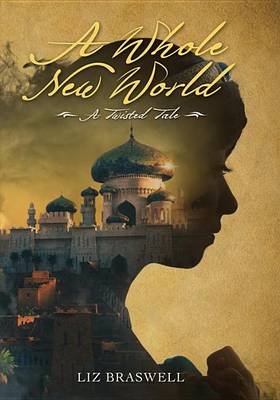Reviewed by Briana @ Pages Unbound on
Full Review:
If A Whole New World were an original work, I would probably just call it a solid fantasy novel that satisfyingly fulfills a lot of tropes, even if it does not necessarily add anything new to the genre and move on. However, as a reimagining of Aladdin, A Whole New World has extra criteria to meet in order to please Disney fans, namely, staying faithful to the original content while still offering readers a unique twist. Unfortunately, the novel too often strays to extremes, either copying the movie too faithfully to be interesting or straying so far that it is difficult to tell it is supposed to be a version of Aladdin, and it never really finds the sweet spot necessary for a great retelling.
The opening scenes of the novel describe in beautiful prose the city of Agrabah. Contrasted with the beauty of the castle and the desert, however, is the quarter of the Street Rat where protagonist Aladdin lives. The initial chapters are the most reminiscent of the movie, which means they’re a great refresher for readers who haven’t seen the film in a while but may come across as boring to those who have.
Things go haywire after Jafar gets his hands on the genie lamp. From here, the novel progresses into fairly fantasy (or even dystopian) fare. Jasmine and Aladdin form a rebel alliance of the most downtrodden citizens of Agrabah in order to wrest back their freedom from tyrant Jafar. Although seeing Jasmine as a kickass rebel leader should have its charms, this portion of the plot never achieves the urgency it aims for. First, Jafar takes over the sultanate and the city with such swiftness and ease it is difficult to imagine how he is supposed to scare readers from this point on; the idea that he wants to take over the world in addition to the city comes across as a throwaway line rather than aa real threat. Second, Jafar happens to be an idiot. He makes a series of choices that are simply so inane and so ineffective there’s no point in being afraid of him. Jafar does not come across as a worthy adversary, and that makes the fight against him dull.
Jasmine and Aladdin do not fare much better in terms of characterization. They’re definitely smarter than Jafar, but overall they seem flat. The author’s best attempts to give them backstories and complex personalities where they must weigh their own needs against the needs of others failed to make me invested. I also was not a fan of the continually repeated point that Aladdin may be a thief ButHeIsSoMuchMoreMoralThanThoseOtherRottenThievesWhoStealProfitNotJustFood. I like complexity in characters. I dislike the trend in YA literature that suggests a character must be as moral as possible for me to cheer him or her on.
Overall, A Whole New World just felt unremarkable to me. I can see the structure of the book and the places where the author tried to make the characters complex and tried to make the action dark. It is just that none of it felt real to me—I was not convince. I think Braswell has talent as a writer and I would be interesting in looking into whatever she writes next, but this one earns a pass from me.
Source: ARC from ALA
Reading updates
- Started reading
- 27 July, 2015: Finished reading
- 27 July, 2015: Reviewed
